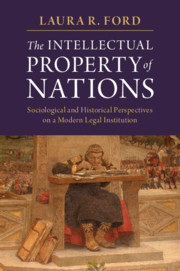 The Intellectual Property of Nations
The Intellectual Property of Nations Book contents
- The Intellectual Property of Nations
- The Intellectual Property of Nations
- Copyright page
- Contents
- Preface and Acknowledgments
- Introduction
- 1 Legal Institutions and Social Power
- 2 Legal Orders and Social Performance
- 3 Instruments of Legal Power in the Roman Republic
- 4 Semantic Legal Ordering
- 5 Cultural Transformations
- 6 Privileges and Immunities in a Sacramentalizing Order
- 7 Administrative Kingship and Covenantal Bonds
- 8 Intellectual Property in a Nationalizing Order
- 9 Cultural Transformations
- 10 Semantic Legal Ordering
- 11 Instruments of Legal Power in the American Republic
- 12 Legal Orders and Social Performance
- Conclusion The Intellectual Property of Nations
- Index
8 - Intellectual Property in a Nationalizing Order
Published online by Cambridge University Press: 04 June 2021
- The Intellectual Property of Nations
- The Intellectual Property of Nations
- Copyright page
- Contents
- Preface and Acknowledgments
- Introduction
- 1 Legal Institutions and Social Power
- 2 Legal Orders and Social Performance
- 3 Instruments of Legal Power in the Roman Republic
- 4 Semantic Legal Ordering
- 5 Cultural Transformations
- 6 Privileges and Immunities in a Sacramentalizing Order
- 7 Administrative Kingship and Covenantal Bonds
- 8 Intellectual Property in a Nationalizing Order
- 9 Cultural Transformations
- 10 Semantic Legal Ordering
- 11 Instruments of Legal Power in the American Republic
- 12 Legal Orders and Social Performance
- Conclusion The Intellectual Property of Nations
- Index
Summary
This chapter traces a rising national consciousness in English law and legal institutions, focusing on the implications of this for the broader shift from medieval privileges to modern intellectual property. The shift is presented through a narrative highlighting the roots of Parliament in the legal principles and transcendent appeals established in the wake of thirteenth century baronial revolts. We see the impacts of this nationalizing legal revolution in the thought-world of the great monastic chroniclers at the Benedictine abbey of St. Albans. And we see the historical legacy of this nationalizing legal revolution in the rise of statutory supremacy and positive legality. These interrelated developments occurred through processes of semantic legal ordering, in which Parliament appropriated traditional rights of prerogative kingship and the church, establishing itself as the guardian of property owned by an increasingly-vocal class of subjects invested (materially and spiritually) in the Protestant Reformation. Two statutory foundations for modern intellectual property resulted from these complex developments: the Statute of Monopolies (1624) and the Statute of Anne (1710).
Keywords
- Type
- Chapter
- Information
- The Intellectual Property of NationsSociological and Historical Perspectives on a Modern Legal Institution, pp. 241 - 269Publisher: Cambridge University PressPrint publication year: 2021


